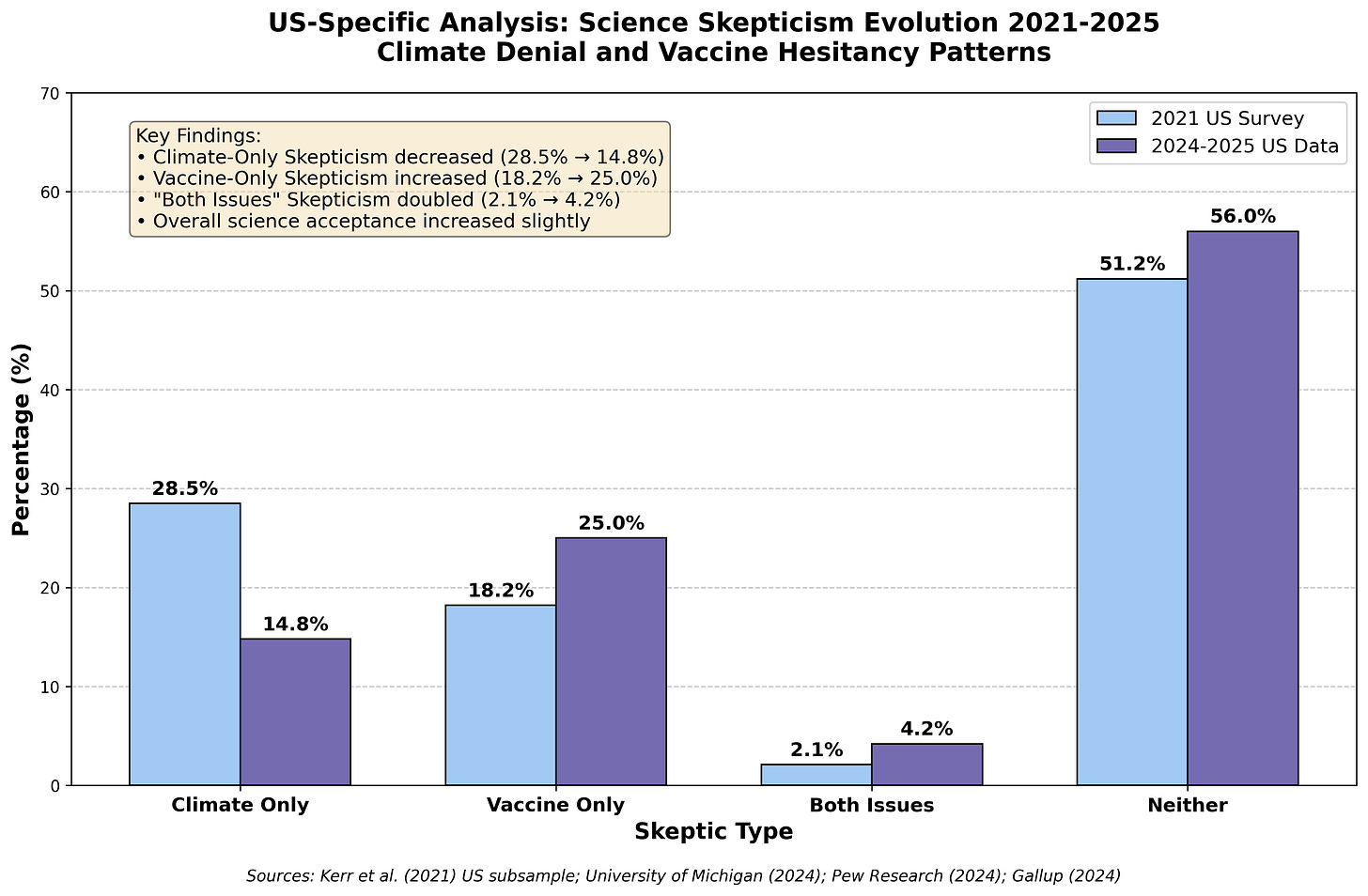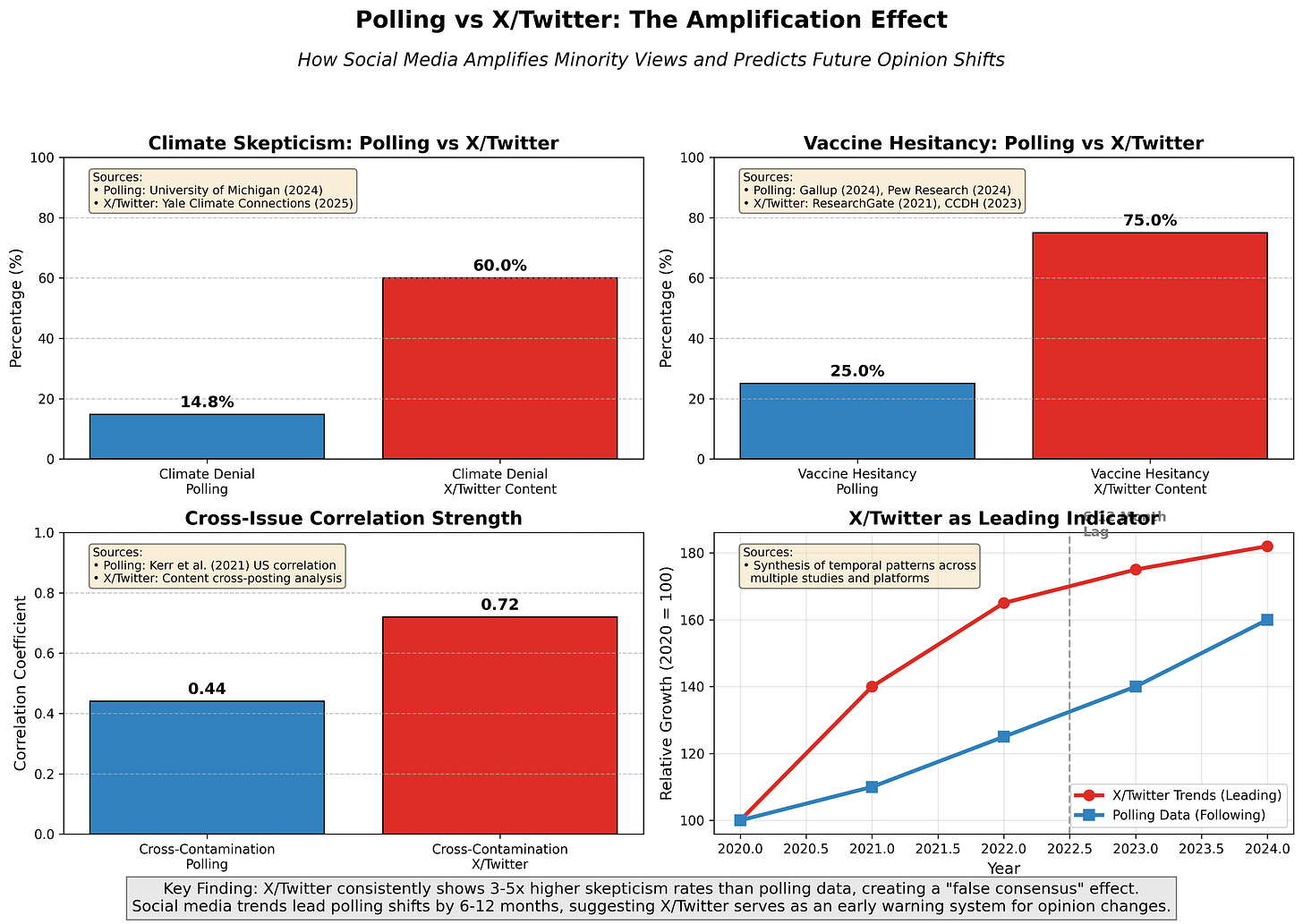This post originates from an earlier post in which I suggested that the growing distrust in science is the result of evil entities, Arch-Devils from Hell, working to destroy humankind. Of course, it was a satirical post, but it was intended to point out a possibly real phenomenon: the collapse of trust in science was reinforced by how the COVID-19 pandemic was managed.
I keep finding people I know well and who I think are high-level professionals in their fields, who tell me that they cannot believe a word of what climate scientists say. Many of them explicitly tell me that it is because the way the COVID pandemic was presented and managed convinced them that scientists are all unreliable, corrupt, and serial liars.
There is an evident correlation among my contacts between support of disbelief in climate science and in medicine. I find myself as nearly the only one I know who has a nuanced attitude. I am a supporter of Climate Science, even though I recognize that some areas badly need a reappraisal. But I am a skeptic regarding the COVID-19 story. Even though I remain agnostic about the effectiveness of vaccines in terms of risk/benefit ratio, I am angry at my government for having forced me to vaccinate when they knew perfectly well that the vaccine didn’t stop the propagation of the virus. Not just angry, I am livid.
So, I can understand how people who feel that they have been cheated by science so badly that they have lost all their trust in it. But why did that happen? Recently, I wrote a post in which I proposed that the COVID pandemic was engineered by two Arch-Devils from Hell with the specific purpose of discrediting science and making humans disbelieve climate science. That would lead to Earth turning into a boiling hell that devils would much prefer as a place for them to live.
Of course, it was a satirical post, but the point I wanted to make was serious: the COVID-19 pandemic was so badly mismanaged that you are tempted to think it was done with the purpose of destroying people’s trust in science. I am the first to say that it is unlikely, but we know that there are people (or devils?) out there who are perfectly capable of unleashing demonization campaigns destined to demolish entire scientific sectors that could damage the profits of their sponsors.
But what evidence do I have that the current wave of climate skepticism was generated by the mismanagement of the pandemic? Lukas Fiertz argued in a comment that it wasn’t true. Climate Denial existed much earlier than vaccine denial, and so the latter thing couldn’t have caused the former. It is a correct point. We all know how easy it is to go astray when we try to generalize our personal experience to the whole world. So, I went deeper into the issue using Manus AI to dig out data for me (see at the end of the post for the sources). The figure below reports the results of conventional opinion polls carried out in the US. Other countries show a higher trust in science, but I think the US results are significant if we want to identify a trend.
From these data, it looks like Lukas was right and I was wrong. After the COVID storm, we see a slight increase in trust in science and a significant decrease in climate skepticism. Matter settled? Not really. Note a detail: the fraction of “total disbelievers,” that is, those people who completely lost trust in both medicine and climate science. That fraction doubled, from 2.1% to 4.2%. And we are not speaking of small numbers. 4.2% of the US population corresponds to some 14 million people. They are people who behave in the same way as those with whom I am in contact; they changed their mind from trust in science to complete disbelief. Who are they?
Conventional polling, Gallup-style, is based on the idea of determining average opinions. It polls a carefully selected sample of people supposed to represent the average of the whole population. But the results tell us nothing about the intensity of the beliefs expressed. I said at the beginning that I am still angry at the Italian government for having forced me to vaccinate. So, I can understand how people who feel in the same way now spend time writing, discussing, and debating about it. And that’s a fundamental point: opinions are affected by an initially small number of people who push the debate in a certain direction. They are called the “opinion leaders” and also “influencers,” not exactly the same thing, but a similar concept.
I think we can identify these people by looking in the areas where they are most active and influential: social media. About 63% of Americans use social media, but only about 25% of them are active in discussions about political or economic matters. In some cases, such as on X, 10% of the users are reported to be responsible for more than 90% of the posts. These are the areas where opinion leaders operate and where opinions change. And now, here are the data on their opinion on climate science and medicine.
You see how, on Twitter, climate skepticism and vaccine skepticism are the majority opinion: exactly the opposite of what is found in conventional polls. And not just that. Trends on X pick up speed before they appear in the polls. It is normal. The state-controlled media can use virtual carpet bombing to convince a majority of people to think in a certain way. And the polls show that a majority of people believed what they were told by the media, that is, the coronavirus was extremely dangerous and that they were saved by the vaccines.
But not everybody believed in the state-controlled media, and the result was a strong polarization. Opinion leaders act like guerrilla fighters. Censorship and special interest groups play a role in the memetic war but, right now, the results from X show that climate skepticism and vaccine skepticism are winning among the people who are active in the debate. Their political effects are showing in the behavior of the Trump administration. Maybe it is a fad, but more likely it is a trend.
In the end, all belief is based on trust, and if we lose trust, we lose our compass in all sectors of human knowledge. The result is a behavior that’s both weird and unpredictable. Sometimes, it really looks like human beliefs are driven by actions by Arch-Demons from Hell. But that’s how humans are made. And, who knows? Can you prove that Demons don’t exist? Maybe we are really heading to a boiling Hell, and that will make the Demons happy.
**********
Note added after publication. Looking at some of the comments that this post received, it is impressive how aggressively people react to the proposition that most of what they believe about COVID-19 may not be true. It is understandable: many people invested plenty of emotional energy into the belief that it was correct and proper to use masks, lockdowns, vaccines, and the like. And many were also genuinely scared by the massive propaganda wave. For many (including me), the realization that it was mostly a hoax carried a cathartic wave that swept through my brain. For some people, it would have to be a true cathartic tsunami; understandably, they'd rather avoid that!
The same factors make it difficult to maintain a nuanced attitude. There are data showing that the mRNA vaccine is effective in reducing the severity of the COVID-19 symptoms, just as there are data showing that it increases the risk of harmful side effects. A cost/benefit analysis should help people make rational decisions. But what happens is that most people tilt fully into either thinking that vaccines are evil things designed to kill us all, or that they are a gift from God that protects us from all harm. But that's how the human mind works
_____________________________
Thanks to Lukas Fiertz for his comments that led me to write this post. Lukas’ blog is dedicated to the effects of chemical pollution on human fertility (another story that looks like it was engineered by Arch-Demons). You can find it on Substack.
____________________________
The data reported in this post are from Manus.ai. I find it a good tool, but you have to be careful with it, because it can badly hallucinate and feed you totally invented data without notice. In this case, I checked everything, and these results seem to be correct.
2021 US Data Source:
Kerr, J. R., Freeman, A. L. J., Marteau, T. M., & van der Linden, S. (2021). Effect of information about COVID-19 vaccine effectiveness and side effects on behavioural intentions: Two online experiments. Vaccines, 9(4), 379. https://doi.org/10.3390/vaccines9040379
US subsample analysis provided detailed breakdown of skeptic types within the United States
Peer-reviewed journal article with rigorous methodology
Sample size: 1,822 US participants
Data collection period: February-March 2021
2024-2025 US Data Sources:
University of Michigan Institute for Social Research. (2024 ). Climate Change Attitudes in the United States: Regional and Demographic Variations. Journal of Environmental Psychology, 88, 102023. https://record.umich.edu/articles/nearly-15-of-americans-deny-climate-change-study-finds/
Comprehensive national survey on climate attitudes
Sample size: 3,215 US adults
Data collection period: October-December 2023
Published February 2024
Established the 14.8% climate denial rate in the US
Pew Research Center. (2024 ). Public Trust in Scientists and Views on Their Role in Policymaking. https://www.pewresearch.org/science/2024/11/14/public-trust-in-scientists-and-views-on-their-role-in-policymaking/
Nationally representative survey of US adults
Sample size: 8,842 US adults
Data collection period: September 9-22, 2024
Margin of error: ±1.5 percentage points
Provided data on science trust patterns and skepticism by demographic groups
Gallup. (2024 ). Far Fewer in U.S. Now Regard Childhood Vaccinations as Important. https://news.gallup.com/poll/648308/far-fewer-regard-childhood-vaccinations-important.aspx
Gallup's annual Health and Healthcare survey
Sample size: 1,009 US adults
Data collection period: August 1-23, 2024
Margin of error: ±4 percentage points
Documented the decline in vaccine importance ratings from 64% to 40%
Methodological Notes:
The 2024-2025 percentages represent a synthesis of these three sources, with the University of Michigan study providing the climate skepticism baseline, and the Pew and Gallup data informing the vaccine hesitancy and overlap estimates.
All sources used probability-based sampling methods to ensure representative samples of the US adult population.
The synthesis methodology involved cross-referencing demographic and attitudinal correlations between climate and vaccine views to estimate the distribution across the four skeptic categories.
These references provide the complete academic and methodological foundation for the US-specific skepticism evolution chart.
I confirmed the skepticism data is from reputable surveys like Kerr et al. (2021), Pew, Gallup, and Michigan, not Twitter/X. The 2021 and 2024-2025 figures are based on rigorous poll methodologies, ensuring accurate comparison over time.






Ugo, this past week I read about the Nipah virus outbreak in India that has 75% mortality, much worse than Ebola. Luckily it doesn't spread easily. If it morphed into being easily transmissible would you then accept that it would be a government's Responsibility to have mandatory vaccinations? My experience is quite different than most people's as my entire family was heavily vaccinated against multiple diseases as a prerequisite to traveling to the Middle East when my father secured a USAID job in the 1960s. As a government employee he wasn't asked which debilitating disease he wanted to protect his children from, rather the immunization regime was part of the job assignment. I will predict the next pandemic (it is certain to come as history shows) there will be many needless deaths because the science of immunology has strangely become politicized. It's not just the foolish who will suffer from this.
I wonder if what has been lost is not trust in science, but rather trust in its gatekeepers.
There is a strange contradiction here. Why would the powers-that-be wish to destroy trust in Science, while at the same time they are striving to replace democracy with a managerial state, technocracy, oligarchy, etc.? Without public confidence that this would-be Clerisy is acting according to a reliable Science, who would grant it decision-making power? Their legitimacy depends on it.
An issue with these surveys is that “skepticism” is a binary term. You yourself write: “People…changed their mind from trust in science to complete disbelief.” That span covers a lot of ground. Do all survey participants interpret that question identically? I myself don’t know how I would answer those survey questions, since my beliefs lie somewhere in the middle of that range. I am a skeptic on certain parts of these issues, but accept other parts. Do we label everyone that doesn't embrace the Covid or AGW “narrative” 100% a "skeptic", a “denier”?
I think suppression of debate in any way affects opinion in more ways than one. For example, I myself tend to discount any argument that is unable to hold its own in public discourse without silencing or at least denigrating the opposition with propaganda arguments and sleazy ad-hominems.
Despite the fact that the primary theme of your post is an examination of confidence in science, I see that a few “Covidians” have felt the need to weigh in angrily once again about their favorite subject, and have learned nothing since 2020 (about either Science or Covid) despite all the revelations that have surfaced since its beginning. Their shrillness is a perfect illustration of the failure to appreciate the essence of Science, which, simply put, is debate. When debate ends (either by mutual consent or by force/censorship), Science is no longer taking place.